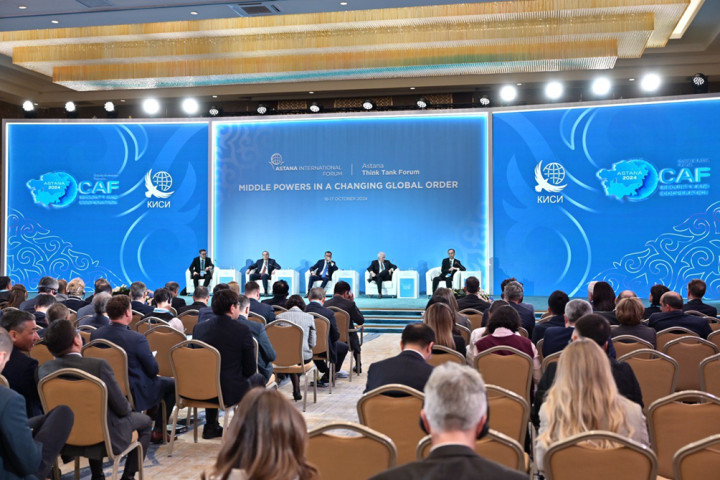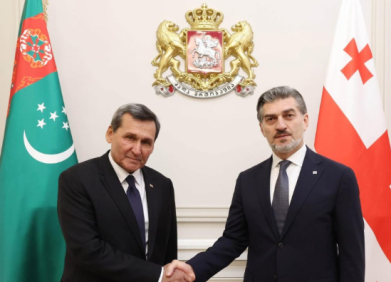Uzbek expert on the emergence of New Central Asia: common opportunities and soft power
19.10.2024 | 04:30 |On October 16-17, the Astana Forum of Think Tanks "Middle Powers in a Changing World Order: Strengthening Security, Stability and Sustainable Development" was held.
The forum, held under the auspices of the Astana International Forum and organized by the Kazakhstan Institute for Strategic Studies under the President of the Republic of Kazakhstan, was attended by more than 45 leading experts from Central Asia, the CIS, the EU, the USA and Asia. During the plenary session, President of the Republic of Kazakhstan Kassym-Jomart Tokayev spoke.
Director of the Institute for Strategic and Interregional Studies under the President of the Republic of Uzbekistan (ISRS) Eldor Aripov took part in the session entitled: "II Central Asian Forum on Security and Cooperation". In his speech, he focused on the development prospects of Central Asia, yuz.uz reports.
As the head of the ISRS noted, even in the recent past, experts called Central Asia the "Central Asian Balkans" and the Fergana Valley a "powder keg", meaning the high conflict potential of the region due to unresolved territorial and water disputes, interethnic tensions.
"We managed to resolve all unresolved issues, remove acute disagreements... This is an example of the long path we have traveled from a situation full of contradictions to reaching the level of trusting partnership and cooperation. Thanks to this breakthrough, we can already confidently talk about the emergence of a New Central Asia," Eldor Aripov emphasized.
According to him, today the region is gradually turning into a space of new opportunities, conjugation of interests and inclusive cooperation.

In this context, the expert paid special attention to the active dynamics of the region's economic indicators. It was noted that the Central Asian economy has demonstrated steady growth (6.2%) in the last ten years, twice exceeding the world average (2.6%).
Against this background, he noted, the volume of attracted investments in Central Asia has almost doubled - from $27 billion in 2016 to $50 billion in 2023. At the same time, mutual direct investments between the Central Asian countries are also growing - by an average of 9% per year.
The region is already considered a promising market. By 2050, the region's population will exceed 100 million people. At the same time, Central Asia will remain one of the youngest - the average age of the population will be about 30 years.
Moreover, the expert pointed out, the region is rich in reserves of rare earth critical materials necessary for digital and green transformation. Taken together, these circumstances increase the interest of extra-regional partners in Central Asia.
According to Eldor Aripov, this is also reflected in the created formats of the "CA Plus" dialogue. Today, more than 10 such dialogue platforms are functioning, 6 of which were created over the past 5 years. At the same time, starting in 2022, many of these formats are held at the level of heads of state - with China, the USA, Germany, the EU. Next year, South Korea will also be included in this number.
The expert is firmly convinced that countries should take advantage of this unique geopolitical situation to defend a common vision and agree on priorities for regional development in cooperation with third countries.
Firstly, according to Eldor Aripov, the region has the opportunity to become an important agro-industrial center on the Eurasian continent. Agriculture is one of the key sectors of the countries' economies, which provides the processing industry.
Secondly, as the expert claims, the relevance of digitalization is growing. Today, digital technologies are rapidly penetrating all spheres of human life and are becoming a driver of economic development.
Due to the geographical remoteness from world markets and high logistics costs, the goods of the countries of the region initially lose in competitiveness. In particular, the share of costs for cargo transportation reaches 50% of the final cost of goods, which is almost 5 times higher than the world average - 11%. The way out of this situation is the widespread development of the IT sector, the export of IT services.
Thirdly, according to Eldor Aripov, renewable energy is becoming one of the most important growth points in interaction with foreign economic partners.
At the same time, answering the question about the soft power of Central Asia, the director of ISRS emphasized that only in recent years have our countries begun to increasingly clearly realize what colossal potential the region has in this area.
Thus, according to the expert, historically, in Central Asia, both sedentary and nomadic cultures intertwined, numerous ethnic groups lived, and a tolerant multi-confessional environment reigned. Zoroastrianism was born here, Buddhism spread further to the East from here, and fundamental works on Islam were written.
As the expert emphasized, "interest in our culture, identity, music, architecture, clothing, cuisine, and achievements in sports is growing all over the world. Taken together, this represents a powerful resource for projecting the soft power of the entire region."
A very positive trend, according to the director of the ISRS, is that we are ceasing to divide our enormous cultural, historical, and civilizational heritage. To argue about the nationality of our great scientists, poets, and thinkers. Today, everyone understands that this is a common heritage.
In this context, Eldor Aripov drew attention to the recently held in Turkmenistan Forum, dedicated to the 300th anniversary of the poet and thinker Magtymguly Fragi, who made an important contribution to strengthening fraternal ties and rapprochement of the countries and peoples of the region, as well as popularizing the rich spiritual heritage of Central Asia throughout the world.
The expert cited as an example a separate resolution adopted in Uzbekistan on the broad celebration of the 300th anniversary of Magtymguly Fragi's birth. In connection with this date, literary evenings, competitions, conferences and seminars are held. Performances are staged in theaters, Uzbek and Turkmen filmmakers made a joint feature film about the poet. Monuments to this great figure have been erected in Tashkent and Khiva. Recently, with the participation of the leaders of Kazakhstan and Turkmenistan, a monument to Abai was opened in Ashgabat.
“This is a trend of amazing significance that once again brings us back into the bosom of one cultural and historical civilization. It creates the preconditions for the consolidation of our common soft power,” Eldor Aripov concluded.
ORIENT news











